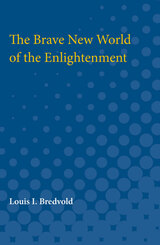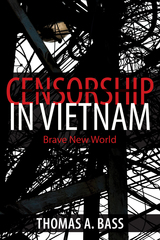3 books about Brave New World

The Brave New World of the Enlightenment
Louis I. Bredvold
University of Michigan Press, 1961
The Brave New World of the Enlightenment is a brilliant introduction to the thought of those centuries, illuminating with a rare intelligence the ideas that brought forth the Enlightenment and the ensuing confusion of our age. In a sustained and incisive critique the distinguished scholar Louis I. Bredvold distills and expounds the thought of Descartes, Spinoza, Leibniz, Locke, Condillac, Hartley, Helvetius, Diderot, and Rousseau, revealing revolutions unprecedented in the history of man. And in so doing he shows the limitations of rationalism, bringing into clear focus the dangers of our lingering inheritance. For, he says, quoting Reinhold Niebuhr, "No cumulation of contradictory evidence seems to disturb modern man's good opinion of himself."
[more]

Censorship in Vietnam
Brave New World
Thomas A. Bass
University of Massachusetts Press, 2017
What does censorship do to a culture? How do censors justify their work? What are the mechanisms by which censorship—and self-censorship—alter people's sense of time and memory, truth and reality? Thomas Bass faced these questions when The Spy Who Loved Us, his account of the famous Time magazine journalist and double agent Pham Xuan An, was published in a Vietnamese edition. When the book finally appeared in 2014, after five years of negotiations with Vietnamese censors, more than four hundred passages had been altered or cut from the text.
After the book was published, Bass flew to Vietnam to meet his censors, at least the half dozen who would speak with him. In Censorship in Vietnam, he describes these meetings and examines how censorship works, both in Vietnam and elsewhere in the world. An exemplary piece of investigative reporting, Censorship in Vietnam opens a window into the country today and shows us the precarious nature of intellectual freedom in a world governed by suppression.
After the book was published, Bass flew to Vietnam to meet his censors, at least the half dozen who would speak with him. In Censorship in Vietnam, he describes these meetings and examines how censorship works, both in Vietnam and elsewhere in the world. An exemplary piece of investigative reporting, Censorship in Vietnam opens a window into the country today and shows us the precarious nature of intellectual freedom in a world governed by suppression.
[more]

Traders in a Brave New World
The Uruguay Round and the Future of the International Trading System
Ernest H. Preeg
University of Chicago Press, 1995
The recently concluded Uruguay Round of the General Agreement on Tariffs and Trade (GATT) will undoubtedly lead to a fundamental transformation of the world trading system as an instrument of a global economy. In Traders in a Brave New World, Ernest H. Preeg, a distinguished former U.S. diplomat and trade negotiator, presents a blow-by-blow account of the Uruguay Round, an examination of the historical context in which it took place, and an insider's assessment of the agreement's future impact on the international trading system.
Preeg places the Uruguay Round in the broader context of global politics and economics, showing how changes in the world order—from the collapse of communism to dramatic economic reforms in developing countries—influenced both the topics of negotiations and their outcome. He then assesses the final GATT agreement as a case study in international negotiations and evaluates its probable effects on income and trade.
Finally, Preeg looks to the short- and long-term issues confronting future trade-policy negotiators. He shows that the international trade agenda will consist of three evolving types of agreement—further multilateral commitments, regional free-trade agreements, and selective bilateral accords. Going to the heart of current debates on the "new world order," an important final chapter evaluates the political and economic relationships that will result from the international trading system.
Preeg places the Uruguay Round in the broader context of global politics and economics, showing how changes in the world order—from the collapse of communism to dramatic economic reforms in developing countries—influenced both the topics of negotiations and their outcome. He then assesses the final GATT agreement as a case study in international negotiations and evaluates its probable effects on income and trade.
Finally, Preeg looks to the short- and long-term issues confronting future trade-policy negotiators. He shows that the international trade agenda will consist of three evolving types of agreement—further multilateral commitments, regional free-trade agreements, and selective bilateral accords. Going to the heart of current debates on the "new world order," an important final chapter evaluates the political and economic relationships that will result from the international trading system.
[more]
READERS
Browse our collection.
PUBLISHERS
See BiblioVault's publisher services.
STUDENT SERVICES
Files for college accessibility offices.
UChicago Accessibility Resources
home | accessibility | search | about | contact us
BiblioVault ® 2001 - 2024
The University of Chicago Press









